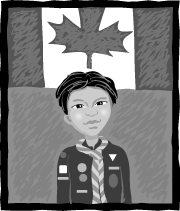
| ||
 | ||
 ILLUSTRATION: TZIGANE |
Scout's honour
|
BRONWYN CHESTER | It may not come as a surprise to learn that Scouts Canada helps young immigrants integrate into Canadian society, but the process, as described by Joan Marshall, an adjunct professor in the Department of Agricultural Economics, might not be what you think.
To the uninitiated, Scouts groups may give the impression of being comprised of old stock Canadians and led by the same. But the fact is, says Marshall, that for at least the past 15 years, many ethnic groups have participated in Scouting as distinct cultural groups. Through observation and interviews, Marshall examined the different ways in which these "ethnospecific" groups and the regular "mixed" or traditional Scout groups (from Beavers to Rovers, serving five- to 25-year-olds) contribute to the integration of immigrant children and their parents. In Calgary, for instance, where the ethnospecific group was Chinese, the children and their leader learn in a Chinese language about Canadian institutions such as the law courts, city hall and the fire station. Because the parents were interested in what their children were learning, they would frequently accompany the children on excursions. "In some cases, we found that parents offered to become volunteers for the group because their children were already members and they wanted to share in the child's learning experience in the new culture," says Marshall, whose $17,000 study is funded by Heritage Canada. Generally speaking, the children in ethnospecific groups are from recently arrived families, while those born in Canada tend to join the local, mixed Scout group. However, in some cases, Canadian-born children would join an ethnospecific group "because of the parents' wish to ensure religious, cultural or linguistic ties to their communities," says Marshall. This was the case of the Greek Scout group in Toronto, and of the Ismailis, a religion-based group, in Vancouver. The Lebanese Scouts group in Ottawa, on the other hand, uses "Scouts as a way of finding out about Canada while remaining comfortably within their own values and norms," says Marshall. Being Muslim, for instance, the groups are separate for boys and girls, with men and women (wearing hijab) leading the respective groups. Marshall notes that because Scouts is international, many immigrants arrive here with a familiarity with the organization. Besides the differences in ethnic composition between the mixed and the ethnospecific groups, Marshall found that the attitude toward the Scout uniforms distinguished the two types of groups: the former, comprised in part of longstanding Canadians, faced considerable opposition to wearing the official garb. The recently arrived children, on the other hand, particularly the Chinese and the Greeks, saw the uniform as a status symbol and it gave them a sense of belonging. In what may be an indication of the degree of social integration of new Canadians into Toronto society, the mixed Scout groups from Toronto were the only ones to have a leadership that reflected the ethnic composition of the children. In the other four cities, the leadership was staunchly old stock Canadian. "At Fairview (in Pierrefonds) there are no non-old stock Canadians among the leadership even though the ethnic composition of the surrounding community is very mixed," says Marshall, a former Scout leader herself and long-time trainer for Scouts Canada in the Quebec Provincial Council. She suspects the difference between the Toronto and Montreal mixed groups, both of which reside in suburban communities, is due to Toronto's longer experience of immigration. Marshall will make the recommendation to Scouts Canada that the organization do more to encourage the leadership and participation of newer Canadians in the regular Scouts groups. And the 92-year-old institution will have good reason to listen: Centraide (in Quebec) and the UnitedWay (in the other provinces), its principal funders, have expressed concern over Scouts Canada's adaptation to the multicultural fact of Canada, says Marshall.
|
|
| |||||